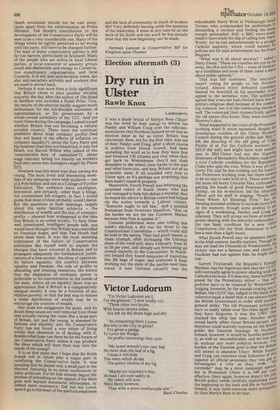Election aftermath (3)
Dry run in Ulster
Rawle Knox
Londonderry It was a shade brutal of Merlyn Rees ('blunt' was the word he kept using) to inform Ian Paisley and William Craig over the tellycommunication that Northern Ireland never was an election issue as far as Great Britain was concerned. Rees, not for the first time, was out of date. Paisley and Craig, after a short course in politics from Enoch Powell, had been spreading the word as to how they were first and foremost UK citizens and that when they got back to Westminster they'd put their shoulders to the wheel, their backs to the wall and what-have-you, and help Britain out of its economic mess. It all sounded very new to Ulster ears, so it's perhaps not surprising that Rees hadn't tuned in properly. Meanwhile, Enoch Powell was informing the surprised voters of South Down, who had just managed to help him defeat a socialist, that he hoped his advice to British voters had helped tip the scales towards a Labour victory. "Someone ought to tell him," said a puzzled Protestant from Newtown Hamilton, "that on the border we are for the Common Market because Sinn Fein is against it." Unionist politicians were also calling last week's election a dry run for those to the Constitutional Convention — which could still be held in the spring. They had good reason to claim triumph, after increasing the Unionist share of the valid poll, since February, from 51 to 58 per cent, and already are forecasting an overall majority in the Convention. In Northern Ireland they hoard memories of majorities like 21b bags of sugar, and everyone is busy working out the state of the parties next time round. A lone Unionist casualty was the
opeci,abor October 19 1914 redoubtable Harry West in Fermanagh South Tyrone, who compounded his misfortune bY demanding a recount and finding his losing margin quintupled. Still, a BBC news-reader needn't have made the slip of calling him 'Han' Worth', for he lost unhumorously to a straight Catholic majority, which voted neither policies nor for past achievement but for Fran" Maguire. "What was it all about anyway? " asked a Derry friend. "These six counties are run by the, army, the IRA and the UDA — none of them Pe` up a candidate and none of them cares a danln about public opinion." That was fair comment. The electorate ! wasn't voting for people to run Northern Ireland. Almost every defeated candidate blamed his downfall on his successful rivars appeal to the sectarian vote. The politicians agreed that everyone had climbed back into ins politico-religious shell because of the contina" ing violence; but it is the continuing inertia 35E well. The voters put their crosses firmly again5„ the old names they knew. They were clutch Mummy's skirt. What happened to the voice of the Protestant working man? It never squeaked, despite the, thunderous rumbles of the Ulster Workerf, Council during the general strike last May;!1` left the shouting to the old gang of Cralg! Paisley et al. For the Catholic workers, tile ' SDLP did well; and might have won another seat in Mid-Ulster had not the lingeringd bitterness of Bernadette MacAliskey supporte a rival Catholic candidate for the Republican Clubs who split the vote. When it was all over' Gerry Fitt said he was holding out his hand ted the Protestant working man, but there seerne„, to be no one to take hold of it. There were ono the same old horny Unionist fists, calloused b) patting the heads of good Protestant babies' Paisley, on his re-election, led the returninga officer and his staff in singing, "Praise Gn_ From Whom All Blessings Flow," but blessing sounded unlikely to include Gerry Fit',; At the moment, though some profess to se'' signs of a weakening, Paisley and Craig ar'A adamant. They will accept no form of imposeu power-sharing with the minority communitY„,c the one basic condition for a new 1-J15`" Constitution (for the `Irish dimension' is ri°'",„ less a mist than a light haze). What Enoch Powell may be adamant abolit,! in the Irish context, hardly matters. Though 11.7, may yet lead the Unionists at Westminster, victory was not a famous one, and clearly, 1; Faulkner had run against him, he might hay lost.
Garrett FitzGerald, the Republic's Foreig!,I Minister, has the ingenious idea that the UtP15,`" will eventually agree to power-sharing with t1"' Catholics because, if it does not, there will be I power for the Protestants either — that WI perforce have to be retained by Westminster; Judging, however, by the sounds coming out Belfast, the UUUC has, lodged in the back Of,' collective head, a belief that it can always hringt. the British Government to order with anothe general strike. The old Protestant politician51 have so easily taken over the reins again that they have forgotten it was the UWC cracked the whip last time. Another striltu, would barely affect Great Britain proper, al1! therefore could scarcely impress on the Britisn public the Unionist message. In Norther,i Il Ireland, however, it would be hurtful political ly, as well as uncomfortable, and we can' do without any more political wounds. Th,.` burden of the Unionist grief is that the BritisP still intend to abandon Ulster. While Paislq and Craig can convince their followers of all: (against all official promises) they can get xiao intransigent a vote as they wish. surrender" may be a short campaign speec t but in Protestant Ulster it is 100 per cell, effective. Once again, however dreary the ' British policy needs carefully explaining f11:1..: the beginning to the rank and file in NorthetP Ireland. It may need someone more symPatile' tic than Merlyn Rees to do that.


































 Previous page
Previous page